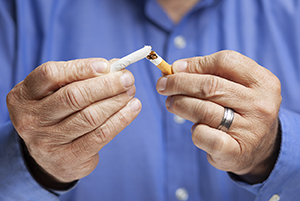Kicking the Smoking Habit
If you smoke, quitting is one of the best changes you can make for your heart and your overall health. Your risk of heart attack goes down within one day of putting out that last cigarette. As you go longer without smoking, your risk drops even more. Quitting isn’t easy. But millions of people have done it. You can, too. It’s never too late to quit.

Getting started
Boost your chances of success by deciding on your quit plan. Your healthcare provider and cardiac rehab team can help you create this plan. Even if you’ve already quit, it’s easy to slip back into smoking. Your plan can help you avoid and recover from relapse. Start by setting a date to quit within a month. And then do it.
Keys to your quit plan
-
Talk with your healthcare provider about prescription medicines and nicotine replacement products that help stop the urge to smoke.
-
Join a support group or quit-smoking program. Talking with others about the challenges of quitting can help you get through them. For more support options, try www.smokefree.gov.
-
Ask other smokers in your home to quit with you.
-
Look for the cues in your life that you connect with smoking. Stay away from them.
Track your triggers
What gives you that “I-need-a-cigarette” feeling? List all the situations that make you want a cigarette. Then think of other ways to deal with these situations. Here are some examples:
|
Situation
|
How I'll handle it
|
|
Finishing a meal
|
Get up from the table and take a walk.
|
|
Having an argument
|
Find a quiet place and breathe deeply.
|
|
Feeling lonely or bored
|
Call a friend to talk.
|
More tips for quitting successfully
-
Meet with your healthcare provider and discuss the use of nicotine replacement therapy. Over-the -counter medicines like nicotine patches, lozenges, or gum help reduce cravings and withdrawal from nicotine. Your healthcare provider may also prescribe medicines to help you stop smoking.
-
List the benefits of quitting and review your list whenever you feel like smoking. Benefits include:
-
Improving your overall health and energy
-
Lowering risk for heart and lung disease and cancer
-
Saving money
-
Improving sense of taste and smell
-
Looking and feeling better
-
Get support. Let your friends know you may call them to talk when you have an urge to smoke.
-
Use the quitline for support. When you call 1-800-784-8660 (1-800-QUIT-NOW) , you can speak confidentially with a highly trained quit coach.
-
If you’ve tried to quit before without success, this time stay away from the triggers that may cause relapse.
-
Make the most of slip-ups. Try to learn from them, and then get back on track.
-
Be accountable to your friends and your quit calendar so that you stay on track.
Tips for family and friends
-
Be supportive and patient. Quitting smoking can be hard and stressful.
-
Suggest and offer distractions to manage urges and triggers. Plan smoke-free activities like going for a walk.
-
If you smoke, now’s a great time to quit. The best goals are accomplished in teams. Even if you do not quit, never smoke around your loved one. Secondhand smoke is dangerous to their health.
-
Celebrate success!
© 2000-2025 The StayWell Company, LLC. All rights reserved. This information is not intended as a substitute for professional medical care. Always follow your healthcare professional's instructions.